Longform Profile | Nathan Toben | Running, Music, Addiction, Sobriety & a 77 Mile FKT for a Cause
by Chase Parnell — October 7, 2020
Back in July, I completed an online Zoom coaching certification course through USA Track & Field. At the time, I was considering entering the very congested space that is online coaching of ultra runners. My motivation for this has since waned. Nathan Toben, already established in the business but getting his certification nonetheless, reached out in the Zoom chat feature after I self-identified as an ultrarunner during an awkward round of virtual introductions.
I don’t recall exactly what he said, maybe that he’d read something on Treeline Journal, maybe that he was happy to not be the only ultra guy on the call; it doesn’t matter now. What struck me was this intentional act to recognize me and make himself known. He built a bridge. After his introduction, I recall watching his video square with greater interest. Reclined way back in his chair, hair long, large headphones with the earmuffs, mustachioed. At some point during our collective slog through the curriculum, he said something articulate sounding to the group, which landed with the teachers and earned him many nods of affirmation from other students. I saw his fiancé walk into the screen a few times in the background of their light and airy living space. Even on Zoom, intentionally or not, he managed to stand out.
At this point, I wasn’t sure if I liked him. I wasn’t sure if he was my type of guy. Was he putting on airs? I’m not proud of the way I psycho-analyze people based on their appearance and a couple words. It’s hard to turn off though and it’s made worse by the fact that many of my initial conclusions are wrong. Over the course of the next few days, Nathan was just another floating box on my screen and we didn’t exchange any further pleasantries.
A month or two went by and I didn’t think about Nathan once, why would I? But then, out of the blue, Nathan did what only a few other people have done since we started Treeline Journal: he told me he had a story to share and asked if I might want to write about it. I don’t know the timeline of things on his end, but he had me wondering if his introduction via Zoom was him laying the groundwork for this story pitch. Probably not, because Treeline Journal isn’t exactly The New York Times. Our readership is still small but sometimes I wonder if people think we have more reach than we do because on occasion we’ve interviewed runners with some level of clout. I also have a tendency to think people have ulterior motives. You know, when that acquaintance becomes a real estate agent and then is very interested in fostering the relationship. Curious.
Before deciding if there was a story, I perused the links he provided and google-stalked him for more time than I’m proud of: fundraiser for youth of color, Mountains to Sea trail, racial equality in the Covid era, 3rd place at a 100 miler in Norway, wrote a poem for iRunfar, he was in a band once, he’s an alcoholic. A sucker for a good redemption story, he starts to grow on me and I feel myself being pulled into his orbit. And I selfishly like supporting good causes, as most people do, because it makes me feel like I’m not a complete leech.
Yes was my answer, I’ll write your story, but I have questions. Many questions. He didn’t know it at the time, but he’d just gone and created a whole lot of work for himself. Over the next handful of weeks, we exchanged emails, mostly me drumming up all his deepest and darkest secrets and asking all the questions that you only could in this situation. As a writer, this is sort of the dream scenario, you don’t feel like you’re being overbearing or taking up too much of their time because, hey man, you came to me!
I mostly wanted to better understand, not so much the fundraiser or his upcoming run, those aspects were fairly straight-forward. What I needed to know was the chain of events and associated emotions that led to this modern day version of Nathan Toben – the guy with the biggest headphones and smart things to say. How did you get here? What about all the trauma from the glory days? Do you feel like a failure? Real soft-balls. To my surprise , he said he was touched by my interest and sincerity and thus began the correspondence. And let me tell you, the guy had answers.
But before we get into those, a bit of a disclaimer. My mother once told me that I am easily taken. One time, after stepping off a ferry boat on Orcas Island in Puget Sound, Washington, after a cursory inspection of the scene, I said to her, “I want to live here.” To which she responded, “You’re so easily taken.” I’ll never forget that exchange because I was smacked with a truth I hadn’t recognized previously. I am always hoping that the next thing will be the thing that changes my life: a place, an idea, a person, anything. To further illustrate, when I first discovered Anton Krupicka and the sport of ultrarunning back in 2010, I gushed about him to such a degree that my boss called me a nut hugger.
So after looking at a bunch of rockstar photographs and reading his prose, I’m fully aware that I fell under the Nathan Toben spell a little bit, as I’m prone to do. It’s for this reason that I don’t always trust my read, or my take. The same applies with my literary tastes. While I am discerning to a degree, I tend to like most of what I read. Then I’ll place these authors on pedestals like they’re Albert freaking Einstein. All that to say, you might roll your eyes a bit as I crow on about the life and times of Mr. Toben. I recognize that I’m also likely fertile soil for his gospel given my recent year without alcohol. I do admire what he’s contributed to the world artistically and the hurdles he’s overcome to get to where he is today. If I misrepresent him in any way, the fault is entirely mine. I’m quite thankful for his great candor that led to the full realization of this piece.
Okay, the foundation is laid. Let’s rewind the clock a bit and start uncovering some layers. It’s October, go grab your cup of tea, this is going to take awhile.
Who is Nathan Toben?
While Nathan most certainly doesn’t feel this way, he is one of those guys that is so gifted that it might actually piss you off. Oh, you’re a damn good runner AND you can sing? Oh, AND you’re good looking?! Wanna spread a little of that DNA around to the rest of us?!
Nathan grew up in Carrboro, North Carolina, which I’m going to call a suburb of Chapel Hill. I understand that to someone from Carrboro, this might trigger them, but most Treeline Journal readers are on the west coast and I’d be shocked if most of us could name more than two or three towns in North Carolina: Raleigh, Charlotte, and Chapel Hill (because, Michael Jordan). I only know one more, Ashville, because I lived in nearby Greenville, South Carolina for a year after college. This is where I discovered boiled peanuts; it’s a thing.
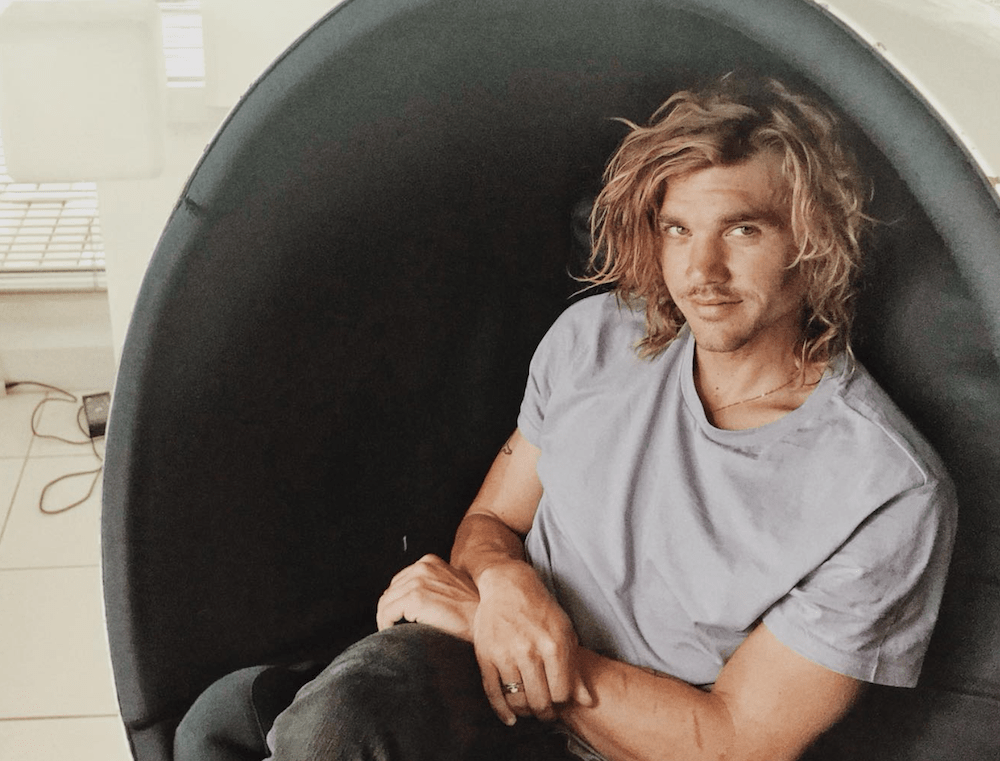
Nathan’s blue steel
Nathan was sucked into the endurance-sport vortex at an early age. At the Quaker elementary school he attended, there was an elective called Running, where kids would log miles on the 1/7th of a mile loop around the schoolhouse. Typically, kids aimed for the coveted 10 mile badge. If we crunch the numbers, that’s 70 laps. School administration allowed students to continue to count laps during free time, even after the Running elective term was over. There were those special few who went beyond: 15, 25, 50 miles. Each level with its own specially stitched badge. No one in school history reached 150 miles. By the end of the 4th grade year, Nathan hit 250 miles [insert head-exploding emoji here]. That’s 1,750 laps around the school. Of course they had to honor his achievement, custom-make a new badge and present it ceremoniously.
“So I had run myself beyond any competitive space, into a rarified landscape of pristine loneliness.” He said. “I relished the solitude.” Perhaps needless to say, traditional team sports were not his jam. “Truth be told, there was always some slightly comical misstep I would make during those sports that my friends would use as an opportunity to laugh at me like jackals. I was a quiet, serious, sensitive kid and this fair bit of bullying went in deep.”
After all those hard-earned miles, he went up in front of the class to accept his custom 250 mile badge and the moment left him wanting. He saw something strange in the eyes of his teachers and peers, “It may have been a combination of curiosity and concern. 10 miles was cool. 50 miles was amazing. 150 miles was extraordinary. But 250 miles was…lonesome.” He said. “For all of the hundreds of times I had fantasized about that very public moment, when the time finally came, it proved to be a lonely one.” He quickly grabbed the badge from his teacher and sat back down. “From then on, though still deeply motivated by fantasies of public praise, I was not as inclined to share my inexhaustible drive with others.”
This is a singular story, but it’s representative of Nathan’s ongoing experience, coming up as a kid trying to find his place in a world that didn’t feel ordered or designed for him. People didn’t get it. They didn’t get him. In some sense, this quick return to his chair, badge in hand, was when Nathan’s retreat into addiction begins.
A Day in the Life of Alcoholism
I ask Nathan about the evolution of his relationship with drugs and alcohol and he sends me a story, another snapshot in time, like a picture that exemplifies an era. The writing was too good for me not to share it in full. Here follows, A Day in the Life of Alcoholism by Nathan Toben.
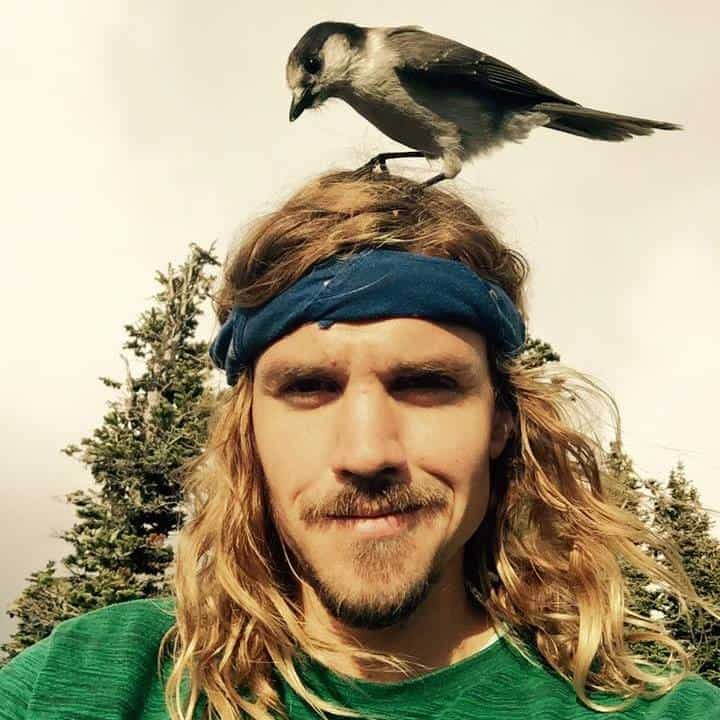
Nathan with gray jay
◊◊◊
It starts and ends with the first cigarette of the day.
I black out at 9am, wake up at noon. I am drunk and hungover from the night before. I head out the door for a dizzied, cough-addled run. I want to get the day started right. First thing to do is burn off the 24 drinks from the night before, but I don’t quite balance the checkbook. I last 45 minutes before walking it in.
By the time I am back, showered, groomed, clothed and fed, I feel almost fresh, if not deeply tired. It is 3pm. My barback shift starts in 30 minutes. The thought brings a low panic to my chest. I hear a voice say something so I turn my head: no one is there. “Cigarette,” I say. I think I’ll have a cigarette.
I walk out to the front porch, revealing a Dr. Suessian stick from its crinkled container – pause for a second – and light it.
As I finish the cigarette, I decide, today is a pot-only day. No drinks, but pot is OK. Cold turkey is a little overzealous anyways, so this is a more moderate approach. I chisel off some resin from the inside of a glass pipe and take a few hits. I am late for work.
I clock in at 3:50pm. 20 minutes late. Without making eye contact with the wait staff, I head to the barroom in the old train station across the courtyard. In a frenzy, I set up: I stack 55 cases of beer, restock the coolers behind the bar and arrange the liquor room and keg room in the order that bottles will be pulled in the night. I have a few cigarettes along the way. The bar opens at 5pm. A few familiar faces trickle in.
As a musician in local bands, folks know me, but not closely. I talk glam rock with early bar goers. Thankfully, the high is mostly worn off by now and I feel almost relaxed, if not deeply tired. I think I hear the back door open, so I move from behind the bar to make sure: no one is there.
A thought comes. Jagermeister.
I walk into the liquor room – 2 tremendous gulps. I check the time. 6pm. Wait. It was supposed to be a pot-only day. Oh well. I have been working hard setting up the bar. I ran today. I ate a healthy lunch. Only 4 cigarettes so far. Everyone drinks. It is good to enjoy yourself every once in a while. Why fight against the beast in this post-modern thresher? I am not ready. I am not capable. Ho-hum. I may as well feel alright in this time of truthlessness.
More cigarette breaks. More hard work as the bar fills. More furtive glances over each shoulder. More conspicuous visits to the liquor room. The bartender is my bandmate and oldest friend. He knows what is up and looks on with concern. Midnight comes and I am drunk behind the bar, serving throngs of college students and townspeople. It is a sweaty rush of micro-decisions and I am making mistakes. My job, at peak business, is to gather towers of spent pint glasses from the dance floor, wash and dry them for repeated use. Thus, the smell of my own drinking is concealed in the town’s drinking.
Finally, 2am arrives and we cut everyone off. Everyone except ourselves. As I close down the bar, I take a few nips in celebration of a hard day’s work. It is all I can do to stay upright. My eyes are glazed; my complexion, pale. The mountain of loaded nachos I had for dinner feels like sandpaper moving through my guts.
As is customary, the staff locks the doors at 2:30am, turns off the lights and comes together to enjoy a couple drinks before heading home. A little cocaine helps to straighten my course. Folks mention a party a few blocks away. With reluctance, I follow my bandmate there. I do not understand why he wants to drink or do drugs socially. I go to the party to talk to my guy, give him half my earnings for the night, and head out. I do not think to say goodbye to my bandmate. I get in my car and I drive home.
It is 5am. I have finally achieved my idyllic situation; I am alone with everything I need to feel good. I drink when I want to drink. I smoke when I want to smoke. I use when I want to use. No one here to judge me – wait. I hear someone coming up the stairs. I open the bedroom door and peer out the crack: nothing.
A thought comes. Tomorrow, you will change. But for now, sit back down. You are OK.
I black out at 10am and wake up at 1pm. I am still drunk and hungover from the night before. I head out the door for a nauseous, cough-stricken run. Yesterday was not OK. Today is the day. First thing first: burn off the 26 drinks I had last night. I don’t make it more than a mile before turning around and walking back to the house.
I shower and throw on yesterday’s clothes. They reek of cigarettes and dishes. I am deeply tired. Lunch is an impossibility so I cock back a wounded soldier from the bedroom floor. Something strange fills my mouth. Then I remember! I run to the sink and vomit. Last night, when I could no longer walk outside for smoke breaks, I resorted to using a bottle as an ashtray. I just drank my ashtray.
I rinse my mouth out and poorly clean the sink. I find a warm, unopened beer and drain it in a few quick gulps. “Cigarette.” I say. I think I will have a cigarette.
I amble out to the front porch. My head pounds with every beat of my heart. My liver aches. I pull a mangled stick from its pack and pause for a moment. I listen to my brain creating its endless ticker tape of thoughts. It sounds like a long prison hallway locking down for the night.
It is 3:40pm. I know that I am not going to make it to work. I am not going to make it work. I know that a series of decisions will transpire today; they will appear as though I am controlling my movements. But a soft voice in my mind whispers, “This cannot last. You are seriously ill.” What I have is different from my bandmate’s heavy drinking.
My eyes fall from the treeline and catch sight of my dirty car. The sideview mirror dangles from a thread. I must have hit something last night. I pause for another moment. There is nothing to do. Nothing but lift the lighter to the cigarette, and inhale.
◊◊◊
I found this story both wonderfully inspiring, knowing where Nathan is today, but also terrifying for me personally as I navigate my own somewhat pathologic relationship with alcohol. But this is Nathan’s story and I had more questions. Tell me about: I hear a voice say something so I turn my head: no one is there.
He says, “I started to get delirium tremens near the end. I was in fact hearing voices that were not there.”
Did they go away when you got sober? I ask.
“It took a while, a few months; I do think that my current propensity for esoteric thinking was tutored up by all the heavy drinking and drug use. When I was young, I thought the gold standard of human life was an artistic life. But be careful what you wish for, because now I would trade the volume in my head for some quiet, uneventful normalcy.”
So how did you get out? How does one in so deep go on to health, to create art, run ultras, find a future?
“I went to rehab at age 27 and have stayed sober through the 12-step model of addiction and recovery. 35 years old now, I am approaching 9 years of continued sobriety.” He said. “Out of the 32 men I was in rehab with, 2 of us have remained sober. It is a merciless disease.”
Give me more, my friend.
He goes on, “What got me to rehab was nothing heroic. I ran out of money and means. I had disappeared for a couple weeks, living out of a motel off the highway, popping suboxone (an opiate withdrawal agent – nasty stuff but it quieted the voices), smoking and drinking. My mom is the primary reason I am alive. When I told her I was coming home, she orchestrated an intervention for me with my siblings and bandmates. I refused to start speaking until my bandmates left. I was humiliated.”
As someone who has watched countless episodes of A&E channel’s Intervention, this was sounding very familiar. I can’t imagine living with those memories.
“But when I heard my mom had secured a bed for me at a rehab up in the mountains, that I had a day to decide before they gave it to someone else, something broke in me.” He said. “I just started to see how rehab would be easier than the effort needed to keep hustling. In AA, they describe this as ‘the perfect pain’; where the pain of surrender becomes ever-so-slightly less than the pain of soldiering on. Two days later, my mom dropped me off at a 42-day in-patient facility. I had snuck a joint the night before, outside our motel room. That was my last inebriation: March 9th, 2012.”
The Front Man
Nathan made two big runs at a music career. First with his band, Toddlers. They released an album in 2013 and although the music industry is fickle at best, and downright impenetrable at worst, they were on their way. After getting sober though, he said, “I walked away from my Toddlers bandmates and negatively impacted their lives. They were as committed as I was to the band and my departure from the group was abrupt. After rehab, I couldn’t manage our democratic conversations about songwriting nor the looming opportunities with labels and press agencies. It was also just plainly difficult to be freshly sober, touring and playing local gigs at my old haunts.” I couldn’t help but reflect on the grade schooler who traded in ball sports to run laps.
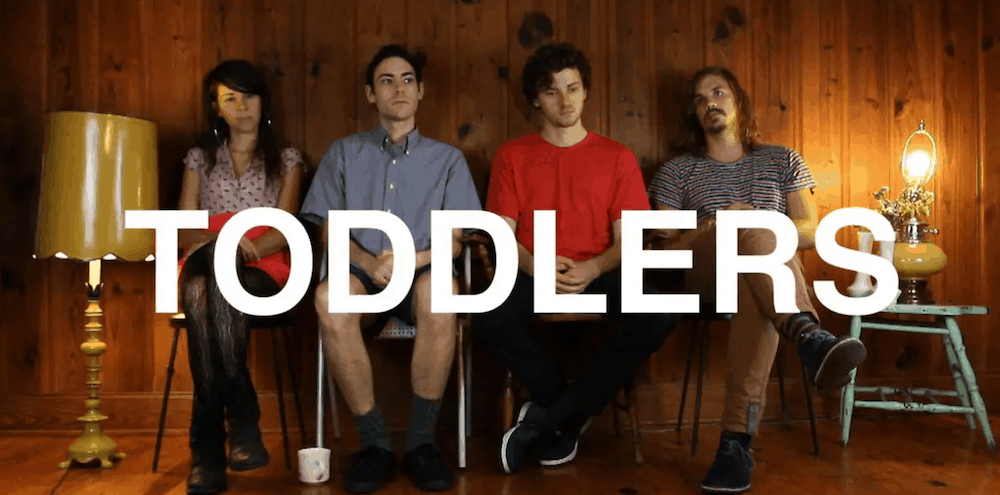
The band
Enter Weller, his solo project. “I was shooting for the stars, not only in terms of how much time and resources I invested, but in terms of the person I wanted to become and ‘the sound’ I wanted to create. As a singer and songwriter, my territory was in coupling a modern psychedelic sound with the sincere baritone personality akin to crooners of yore: Roy Orbison, Scott Walker, Harry Nilsson, Lee Hazelwood, Willy Nelson. I grew up obsessed with somewhat oppositional genres: 13th Floor Elevators and Patsy Cline, Pink Floyd and Leon Redbone, The Monks and Tom Waits.” This is the part in the conversation where my eyes always glaze over and I pray they don’t ask what kind of music I’m into. I don’t know, I just watch NPR’s Tiny Desk concerts on YouTube and assume I’m listening to good shit.
Rather regrettably, I press into the success/failure paradigm. I see a young gifted artist that put out records, made a splash, but ultimately didn’t make it. I liken it to the time I wrote a novel and it went nowhere. I know it wasn’t wasted time, but it still hurts to reflect on something that didn’t go, that didn’t get swept up in the magic you hear about.
“I don’t regard my time as a musician as a failure,” he rebutted, “however, the pain I caused my bandmates and the severed relationships during my transition to sober living, those things still haunt me. I am not in touch with any of them, nor am I close with many friends from my childhood. Perhaps it is time to reach out.”
He is a better man than I.
“I still write and play music in the evenings. Ballads, love songs, storytelling, pretty gouache folky stuff.” Pass me the dictionary, kind sir, and turn it to G. “I love where my music sits in my life now. It is this gentle, private practice that my partner Carina and I share.”
While he may not view his music career as a failure, he does acknowledge his failures in a generalized sense, and of course, in the most positive and healthy light possible, “Getting so close to death and then clawing my way back, it is hard not to see all of my past failures and successes on a continuum of self-actualization.”
His Weller album came out in 2015. It too did not blossom into some viral locomotive, bringing immense wealth, status, or prestige. His music touched listeners all over the world, but it would seem he grew out of that project too. “Once my self-image detached from the confining landscape of the music scene (this was a couple years into sobriety), my health and fitness took center stage.” He said. “To be honest, I always felt like an outsider as a musician. I couldn’t list Beatles albums chronologically. I knew very little about record labels or the anatomy of a successful indie music career . . . I was just a kind-hearted, uninformed drunk with a fascination for psychedelia and sincerity. And when you took the drunk away, a runner remained.”
Drop the mic.
A Runner. A Depressive. A Binge Eater.
Once free from the noise of addiction and the music scene, the kid who posted 250 miles around the schoolhouse, was finally nurtured and ready to grow. Throughout sobriety, he’d learned a thing or two about daily disciplines, saying they, “can easily be transposed into the work ethics essential to effective endurance training.”
Nathan is a good runner and I’m not just blowing smoke up his ass. He was 4th place at the 2018 Pinhoti 100 miler. While that might not sound like much to some, to put it in context, Jeff Browning won the race that year in 16:30, Kyle Curtin was 3rd in 17:08, and Nathan was right there in 17:13. He was in striking distance of a few of the long haul greats.

Nathan running the Arctic Triple Lofoten Ultra-Trail race in Svolvaer, Norway
He’s also motivated to get better. After becoming a coach, he’s begun to apply much of what he learns to his own training and racing. Don’t sleep on this guy! He might just show up to a big 100 someday and take the crown. Not to mention the fact that he’s done all this while dealing with an entirely new set of struggles, still riding the ever-present continuum of self-actualization as he called it.
It came up when I asked about his mental health today, “I live with Major Depression and Binge Eating Disorder.” He said. “Physical activity is wonderful for my mental health, period. But I do want to say this. For individuals similar to myself, it is essential to become acutely aware of how heavier bouts of training, plus the use of sports nutrition, can compound on one another to create acute, horrific episodes in regards to depression and eating disorders.”
I can’t help but reflect on Rob Krar’s very public battle with depression as well as Mike Foote’s vocality around binge-eating. But sheesh, to have both?! Somebody needs to cut this guy a break.
“Simply put, a long run for me is not simply a long run.” He says. “A long run is putting a bottle of whisky to my lips, pausing, and then pulling it away before I take a sip. Because long runs and big training blocks require intense hormonal releases and strategic sugar intake, more often than not, the day after big training days or weeks, I am madly preoccupied with the thought of food. It feels like I want to jump out of my skin. I never asked for this, I do my best to ask for others’ guidance in these moments, but I assure you: I am a highly disciplined person and yet there is almost no defense against sugar and depression. A binge is pretty much going to happen over the course of a training block.”
Okay, so what is a binge? “I am talking 6,000-12,000 calories in a handful of hours. It sounds almost comical but B.E.D. and other EDs lead thousands of Americans to early graves. This is how serious I must consider peak training and the taper.” It was hard for me to imagine Nathan sitting down for a 10,000 calorie meal. That would be roughly analogous to eating an entire thanksgiving turkey.
“I had the best week of training in my entire life two weeks ago.” He said. “115 miles with 3 workouts. How am I doing? You better believe that I am really struggling right now.” What an interesting concept: an inverse relationship between volume and quality of training and mental and emotional well-being. I don’t like it, but can see how it is Nathan’s reality.
Mountains to Sea | 77 Mile FKT
Okay, now we’re starting to come full circle. And we’ve finally arrived at the story that Nathan actually wanted me to write about: his fastest known time attempt on a 77 mile stretch of trail near his home in the central North Carolina countryside. His goal, and this shouldn’t surprise you at this point, is to raise money for a non-profit offering cycling opportunities for children of color. And really, this is what I love so much about Nathan’s story: it doesn’t end with sobriety. Not that he owes us anything, or that he needs to offer up any form of penance for all the debauchery he expensed, but instead, this is just who he is now.
Throughout 2020, Nathan felt what many of us felt: an outrage over cases of police brutality and the killings of people of color without just cause. But this was also the year of Covid-19. A moral dilemma existed for Nathan where he wanted to be a part of the fight for equality without reservation, but to do so responsibly and in a way that wouldn’t spread the virus to the vulnerable populations he interacted with on a day-to-day basis.
After consulting with friends, family, and even leaders in the black community, and getting their blessings, he decided to use his gift of running as the vehicle to drive change. Instead of linking arms at a peaceful protest, he’d turn over his legs to galvanize his community groups and contribute to the cause in a concrete and tangible way.
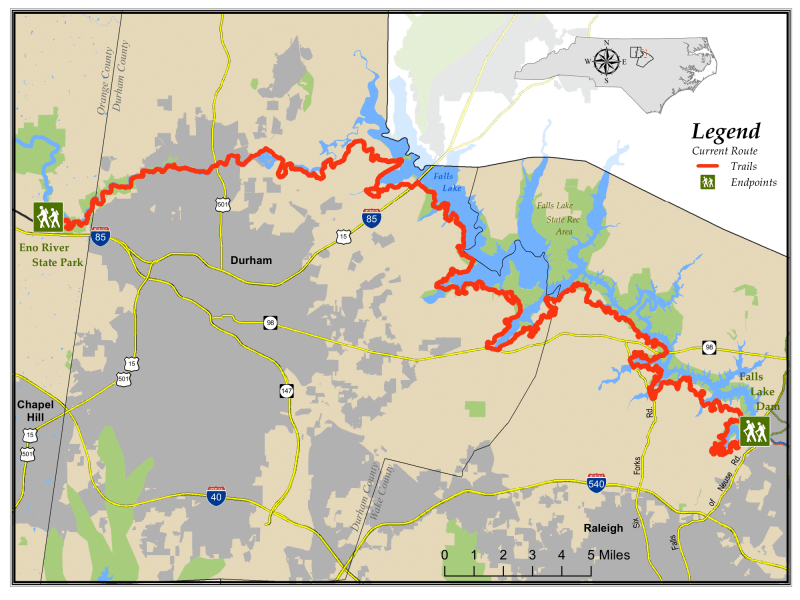
Segment 10 of Mountains to Sea Trail
The Mountains to Sea trail is North Carolina’s long trail, from the Great Smokey Mountains in the west, starting at the NC/TN border, and winding its way east towards the sea, ending at the salt marshes of the Outer Banks. The route is divided in 18 segments, covering 1,200 miles across the state. Nathan is taking on segment 10, 77 miles in one go, with a goal to run the segment as fast as he can, laying down the gauntlet for anyone who comes after him with a similar ambition.
The Beneficiary: Triangle Bikeworks
“Kevin Hicks, Founder and Executive Director of Triangle Bikeworks, is an incredible man and educator.” Nathan says. “I mean think about this: he sees how his own kids are on unequal footing with their classmates. He sees The Bicycle as this youthful symbol of freedom. So he creates a non-profit where he takes kids of color from surrounding schools on 700-mile bike tours, logging up to 55 miles each day . . . Some of their tours have been 2-3 months long! And along these routes, the kids learn of ‘forgotten histories’ that their schools do not teach them; The Underground Railroad, The Trail of Tears, The Gullah Geechee Corridor.”
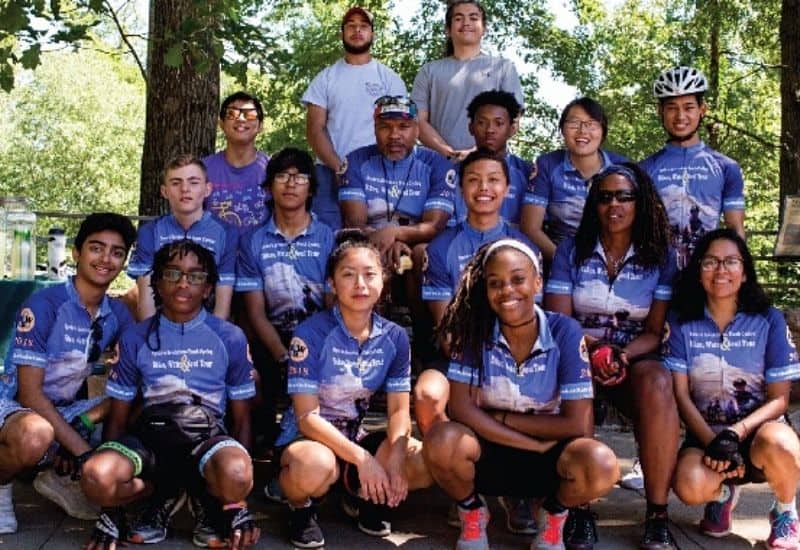
Photo courtesy of Triangle Bikeworks
I imagine North Carolina is just as divided, if not more so, than many states out west, so I asked him if he’d experienced any sort of push-back from his community. “The meager amount of backlash I have gotten has been along the lines of, ‘Look at this guy virtue-signaling.’ My life has not been threatened. My sense of safety has not been compromised.” And here is where I feel many of us can relate, “I am not immune to feeling like an imposter,” he says, “like some gallant white boy making up for something, but through continued communication and collaboration with Kevin Hicks, the founder of Triangle Bikeworks, I am confident that this project has true heart.”
Now watch this. (6 minutes)
Nathan set out to raise $5,000 and I’m honestly not surprised that he has already exceeded that amount. But you know, what if we tried to double that? What if Triangle Bikeworks was able to build into their 2021 budgets ten extra thousand dollars to work with? How many more young boys and girls of color will get to experience one of these extremely formative adventures. What might they learn about their history and themselves? And how might that set them up for future success in a world where the deck is stacked against them? If you feel moved to donate, you can donate a flat sum or pledge a small amount for each mile Nathan completes on October 21, 2020.
Thank you so much for partnering with Nathan and Triangle Bikeworks.
What Lies Ahead
I have a suspicion that Nathan’s future will be bright and that all this diligence in sobriety, running, intentional living, and bridge-building is going to lead to good things. How could it not? Of course, the term bright future can only be defined and measured by him, but even objectively speaking, I’m excited to follow his journey and see where the winds of time take him.
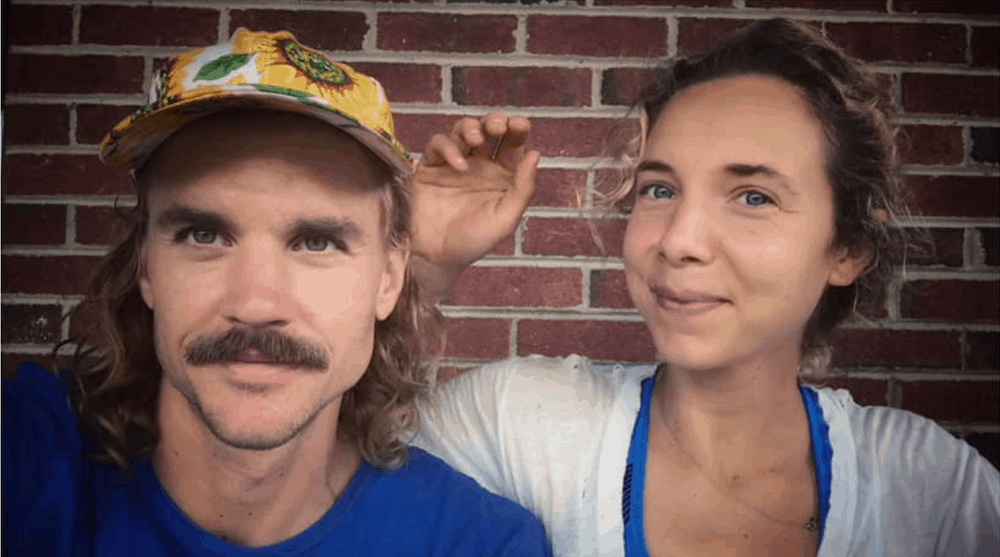
Nathan & Carina
“The next few years are a complete unknown.” He said. “I plan to marry my partner Carina and do fun things with her that make her a happy, happy person . . . Carina is completing construction on a tiny-home-on-wheels. We aim to grow food, run and live nimbly together. I plan to build out my mobile coaching business with The Endurance Collective (Durham, NC); help athletes of all skill levels to tactfully move beyond limiting beliefs. I plan to see how good I can get at ‘this stupid sport we all love’, to quote Eric Shranz.”
With respect to his openness and honesty around depression and binge eating disorder, Nathan specifically noted that, “Cultivating this safe space is something I intend to do for the rest of my life. So if anyone comes out of the woodwork through this piece, you can send them my way.” What a guy, right? You can reach out on social media or email him directly at nathanbtoben (at) gmail (dot) com. I feel okay about sharing this because he also put it on his fundraising page. So reach out! Let’s take a single step towards creating an infrastructure of support here.
There you have it. Nathan Toben as interpreted and rendered by Chase Parnell, consumed by you in this particular moment in space and time. I ask that you consider why you’re here. Why you’ve finished this ridiculously long article. Where you go from here.
As for me, I really enjoyed this longform presentation because it allowed me room to appreciate a certain mysticism about life; how a chance interaction with another human can sometimes manifest into something more, something good. I’m not saying Nathan’s story blew up the established order in my life or triggered the exact synapses to allow me to solve all my lingering existential crises, but he has certainly become another data point in the matrix, a contribution to a clearer lens through which I can analyze the world and my place in it. I hope his story and his mission do the same for you.
Links to Further Exploration
Again, Nathan’s fundraising page.
The Endurance Collective where Nathan coaches.
Nathan’s instagram page. A real must-follow. Last post: cows.
Listen to the Toddlers album.
Toddlers video raising money to make studio album | 4 minutes.
Listen to his Weller album.
The Wolf of Lapland by Nathan, poem published on iRunfar.
Nathan’s Dad ran Western States, Nathan paced him. URP article here.
Fastest Known Time entry for Mountains to Sea segment 10.
Friends of the Mountains to Sea Trail.
Beneficiary Triangle Bikeworks.
If you enjoy this type of in-depth longform narrative, consider supporting Treeline Journal by becoming a patron for as little as $2 a month! We’d love to be able to continue telling these stories! Thank you!


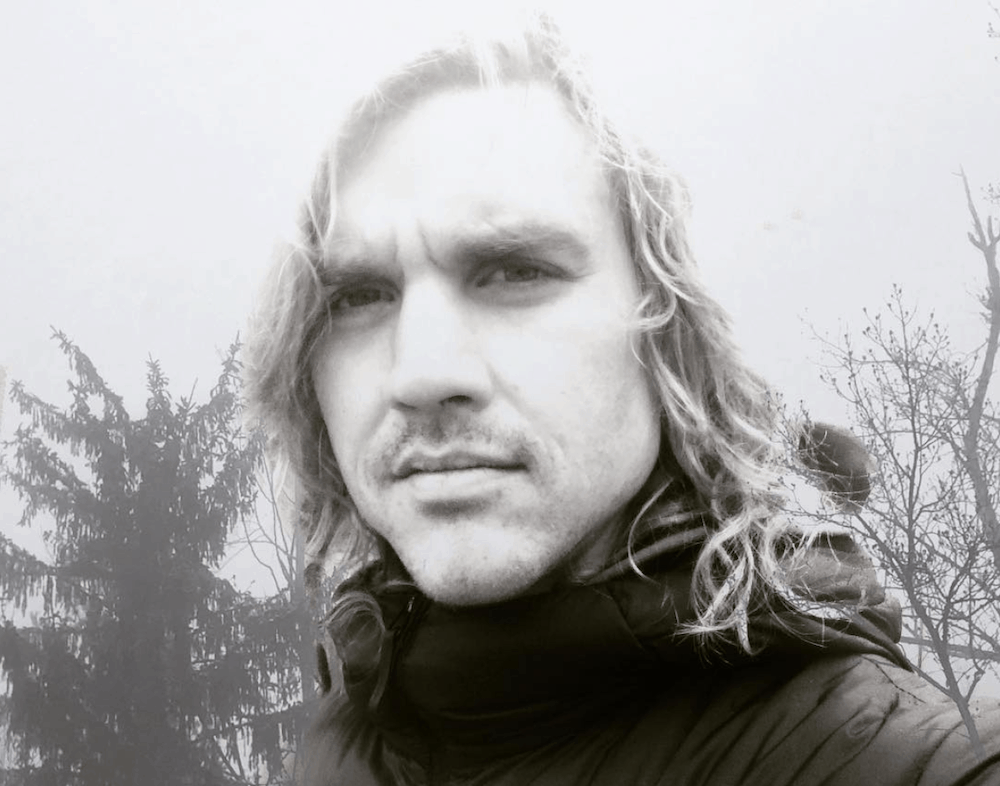


Wow!! You captured the essence! I watched the unfolding – the 250 miles at CFS, the artist and musician, the benevolent alcoholic, and the metamorphosis to ultra runner and coach. He became my coach and at 58, I ran my first 100-miler. Then one a year and Western States at age 60. He coached and paced me. I could never have dreamed of doing those and wouldn’t have finished without his steady “pacing” in all its forms. Was it Proust who wrote that the “sins of the father are repeated in the sons?” Nathan has led me and our generational sins on the long and painful path towards redemption. His dad.
Thank you Tim! Means a lot coming from you. And wow, awesome you got to experience Western States with your son. I have 6 or 7 tickets in the lottery but haven’t had the name pulled yet. Checked out your eco-institute. What a cool project and mission. You guys are all doing great things! Keep it up!
As always, I sincerely appreciate the introspection you project of yourself and that which you bring out in others, Chase. Keep the long form coming and the connections running deep. It’s a gift. It helps.
Aaron! You’ve been a great supporter from the very beginning. Thank you. Keep saying nice things though and I might start pestering YOU for an interview. You contain multitudes. Hope all is well!
Hope all is well!
Chase, it has been a great pleasure to work on this with you. I loved the part about how your mom said you were “easily taken”. I absolutely love that, and love people like this. Your open-mindedness and caring is what produced this massive, complex literary gift and I am deeply grateful to be a recipient. It is a strange feeling, your article brings up seemingly contradictory emotions for me. Pride and vulnerability. Fear and gratitude. I just hope to convey to anyone who might find commonalities between them and myself; sharing the darker stuff was not an easy process (truth be told, on my run yesterday, I felt apprehension that someone driving by can now point there finger and say, “hey that’s the guy with the eating disorder”) and treatment for these progressive illnesses has no tangible end date. But that does not mean actual change can’t happen quickly. I know in NC, liquor sales have shot up since the pandemic. It is safe to say that our increased isolation is a substance-dependence accelerant and that many of us are playing mental gymnastics with our drinking or drug use, at home, alone. I do not consider myself a role model and would never condescend to anyone struggling, so if there are folks out there who want to just have a casual conversation, on equal footing, with someone who has messed up more than themselves, hit me up. nathanbtoben at gmail dot com
Nathan, thank you for your vulnerability and sharing all you did. Sometimes I take it for granted and forget that it’s uncomfortable, for some more than others, to share publicly in this way. It was also my mom who told me recently that I’m *good* at sharing personal stuff in my writing. I had never considered it a skill to be open, and I guess I still don’t, really, but maybe there is something innate about being open and free and valuing transparency. For me, I can certainly be more honest on the page than I’m capable of being in person. That’s not necessarily an admirable trait, but one I’m trying to embrace, instead of fight. I think being honest and genuine with what’s going on under the surface (so long as it doesn’t hurt someone else) is one of life’s most important objectives. Serving up, what you called in an email, “that real real shit.” So thank you for going there. I think others will benefit. More in an email to follow. Best.
Fascinating read. Chase – I love your writing style, it was amazing to get to know you through your writing. I grew up alongside Nathan and I never knew any if this. I admire your means of sharing his story and your own.
Nathan – I appreciate your honesty in this piece. Wish I had gotten to know this side of you at CFS.
Thank you Sonia.
Thanks Chase and Nathan for a great read. This reminds me of the quote ““Be kind, for everyone you meet is fighting their own battle”…or something like that. This honest writing and sharing of real life is helpful to many, thanks!
Great quote, agreed. Thanks Ned!